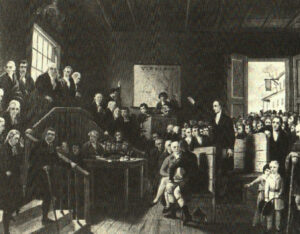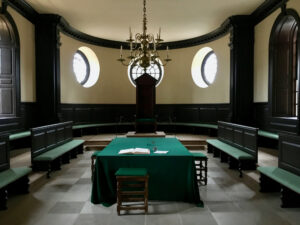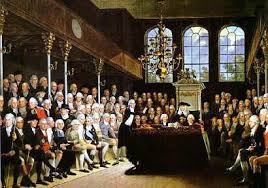Americanism Redux
May 9, your today, on the journey to the American Founding, 250 years ago, in 1774
(September 10, 2001)
It’s the last day before…it happens. One more day and then…boom.
Ahead of the moment, you’re totally unaware. You don’t know, you can’t know. Only hindsight makes it clear—the arrival of the thing that changed everything. Life’s not the same afterward. You know that more after smoke clears and, more importantly, time passes.
Think September 10, 2001. Yes, the 10th. The last day before the next day when out of a clear, blue sky…
It’s today and you don’t know a major change heads or flies or sails your way.
* * * * * * *
(Harmony’s sight, heading toward Boston)
Only fifty miles left to go. Cutting through the North Atlantic toward the rocky coast of the colony of Massachusetts, Captain Shayler is on the final day of his sailing run from London to Boston. The voyage was typical for this time of year—calm for a bit, stormy for a bit, warmish in the day, chilly in the night. A gale looked likely, ice flaked on the cordage, and winds whacking his face as more the norm than not. Ah, just one more day and we’re in Boston, thought Shayler, running a hand along the side of Harmony, his beloved ship.
Below deck, where light flickered in a few lanterns, amid the barrels and chests, thick packets of parchment lay dry, tied in bundles. Some of the packets contained blinding explosives.
Words.
Their contents: detailed descriptions of the Boston Port Act passed into law by Parliament and approved by King George III, six weeks ago. Starting June 1, unless payment received for tea destroyed, seafaring Boston will go silent in everything water-going—no ships, boats, and vessels in and no ships, boats, and vessels out. The hinge of the community’s entire economy and way of living will be ripped from the wall until and unless atonement.
Boom.
Harmony keeps its course toward the Boston rocks.
* * * * * * *
(the legal space–a source of ongoing anger)
With Harmony and Captain Shayler a day away, a particular group of colonial rights supporters in Boston, colony of Massachusetts, have the same conversations they’ve been having for the past year. A number of lawyers, court officials, elected legislators, and town councilors talk angrily about changes in the way judges are picked. One of these supporters writes these words: “There is no appointment in this Government (of Massachusetts), especially under the present situation of our public Affairs, of greater importance than that of a judge. It is the reasonable Expectation of this People, that Men who are thorough Judges, and have too much Honor to be made the Instruments in carrying on the Measures of a corrupt Court, should be promoted to the Bench of Justice.” It’s vital, the writer concludes, that “the People”—not the governor and favor-seeking cronies—choose the judges.
After all, everything down to now suggests that local judges are the key to the colony’s freedom, rights, and liberties.
How would anything else matter?
In the time it takes to read the writer’s essay, the Harmony is almost a mile closer to the rocks.
* * * * * * *
(re-enacting the action of Edes and Gill)
Ships like the Harmony are vital resources to Boston media owners like Benjamin Edes and John Gill. They rely on such ships to carry personal letters, essays, and other documents from Europe which they reprint in their own newspaper, the Boston Gazette and Country Journal. They may also write original articles around information contained in these pieces, using a dash of fresh analysis to re-present them as new-news. Edes and Gill have done exactly that in today’s edition of their newspaper. The printers emphasize to their readers that an amazing groundswell of support for colonial rights has emerged across England—”Old England rising on behalf of New England” might be a catchy, eye-grabbing way to put it. Edes and Gill are always in the market for phrasing that grabs the attention of Boston’s readers.
Oh well, hold that line for next time. There’s always a ship coming in with the stuff of news and new-news.
* * * * * * *
(the look of the second letter)
Today, also in Boston, is a writer who relishes getting published in any newspaper. Words of freedom. For the time being, however, this writer works on two letters for private use only.
19-years old, newly freed, and joyfully un-enslaved, Phillis Wheatley writes two letters from two parts of herself.
To a Christian minister leading a church, Samuel Hopkins in the colony of Rhode Island, Phillis writes advice from her mind. She’s learned from Hopkins in earlier correspondence that the first black Christian minister to travel to the African continent, Philip Quague, is struggling to preach the Christian gospel to native people in local tribes. Phillis advises Hopkins to tell Quague to stop instructing them, stop preaching at them, and instead attract them and draw them to him through his example of personal conduct. In so many words Phillis urges Hopkins to tell the young black preacher to live with them, don’t yack at them, and they will come.
To her dearest sister-like friend, Obour Tanner, also in Rhode Island and an acquaintance of Hopkins’s, Phillis writes of something else from her soul. Fears, worries, a sense of self-limits, a whiff of deeper self-doubt. She believes God rules life in total, taking some things back, bringing some things forward, all in the realm of keeping the faith and staying the course. She wants her cries and lamentations to be read by Obour. She wants herself to hear them, too. And above all, she wants God to listen and reply.
Phillis will wait for an answer as dolphins follow a ship in the ocean, a man standing on its deck as the tides roll in.
* * * * * * *
(a street in the town he wants to leave)
Alpheus Rice, three years older than Phillis, waits for an answer, too. Today he visits with a Christian minister in a search for advice. Rice’s question is about college. He’s currently enrolled in Providence College in the colony of Rhode Island, a school well-known to Reverend Samuel Hopkins, recipient of the letter from Phillis Wheatley. Alpheus Rice isn’t happy at Providence College and wants to leave. He is thinking about enrolling in Dartmouth College in the colony of New Hampshire. He’s not entirely sure, though. A final decision eludes him. It’s a key moment and he wants to get it right.
Another day of reflection can’t hurt. The world won’t change overnight.
The Harmony and her crew sail past the Cape’s northernmost tip on the Boston approach.
* * * * * * *
(placed on the center desk)
Today, six-feet, two-and-a-half-inches tall in a ramrod posture, a thin man with light skin and reddish hair strides across the tiled floor of the House of Burgesses—the legislature—in Williamsburg, colony of Virginia. He has a written document in his hand. He places the paper on a desk near the front of the hall and its assembled elected representatives. “My petition”, he calls it.
He is Thomas Jefferson and, actually, it’s not only his but also his wife’s petition. Martha Eppes Jefferson and Thomas Jefferson are plainly stated in the document conceived by husband and wife.
The object of the petition is boring stuff, of dirt on the ground and dust on the books. Regardless, the petition’s topic beats in Jefferson’s heart and flashes in Jefferson’s mind. Land. Inheritance. Rules of ownership and rights of the owner to do what he wants, especially in one’s own life and living time.
He is asking the Virginia legislature to allow for 2,400 acres inherited by his wife from her deceased mother to be freed from laws that Jefferson sees as restrictive, limiting, and, truth be told, choking. He calls for the colony’s lawmakers to approve the exchange of inherited acreage in one county for that of similar value in another county, and for the land to be sold and used however the Jeffersons see fit without restrictions from birth order, birth gender, birth anything. None of his requested items are currently allowed in the colony’s law for primogeniture and entail, the fancy titles for such issues of eldest sons inheriting land and families keeping their holdings together without division.
To himself and others in his circle of friends, Jefferson talks about the need to prevent one generation from confining and denying the freedom, rights, and liberties of next generations. Today’s petition is action in direction.
With the petition on the table next to the Speaker of the House, Thomas Jefferson walks back to his desk. He sits down in Jeffersonian style—straight, complete, all lines and angles in graceful position.
Outside, the James River flows slowly by. Boats on the river make for Chesapeake Bay, where waters are warmer than the North Atlantic.
* * * * * * *
(two spots–upper Ohio and lower Appalachian)
When the blood flowed into Yellow Creek last week, the blood of Native people killed in a massacre by Daniel Greathouse and his irregulars, the red broke down and then disappeared into the Ohio River. Invisible traces stayed in the water that flowed southwest with floating sticks and tree branches, toward the Mississippi and, one day, into the Gulf of Mexico.
The bloodless water will be Gulf-side long after the arrival of Harmony into Boston harbor.
At the Ohio’s headwaters, William Crawford writes today to George Washington about the chaos of Yellow Creek, the panic of people in the face of war, a mass evacuation of the region eastward “over-mountain” to a perceived and assumed place of safety. Crawford notes that one hundred men have joined with him in going to Fort Pitt where he still hopes a “council” might restore order and put war back in the box. He complains that Dr. John Connolly has worsened conditions with his taste for armed force, his crude attitude toward civilians, his disdain for peaceful solutions. He urges–to the point of begging, nearly–that Washington consider taking charge of events along the upper Ohio. Crawford writes from a region where Pennsylvania, Virginia, and dozens of Native tribes and shifting Native alliances are clashing over control.
Meanwhile, at the southern end of the Appalachian Mountain chain, Thomas Fee sits today in a cabin near Fort Ninety-Six in the deep southwestern interior of the colony of South Carolina. A few days’ ride from here is the Chattooga River, the upper river border between the colonies of South Carolina and Georgia. Fee is staying put, however, with no need to move coming to his mind. He’s safe.
Friends of his broke him out of jail at Fort Ninety-Six. It was an act of defiance accompanied by shouts and yells that dared anyone to intervene. Fee had been imprisoned there after a posse mandated by the British Governor of South Carolina, William Bull, for Fee’s murder of a Native leader, Mad Turkey. Fee’s killing act had occurred in a recent bloody back-and-forth of Native on British colonist, British colonist on Native, Native on Native. The knife blade, hatchet edge, and musket trigger had all been used because of British traders exploiting Native consumers and seizing land for unpaid debts, British land-buyers and settlers rushing inland to grab and claim the seized acreage, and Natives clashing with each other in clinging to power, autonomy, and hunting grounds. Treaty-signers last year (’73) at Augusta believed or hoped to believe or pretended to believe they were organizing this mess into a workable calm. They were wrong and likely could never be anything but wrong.
A blacksmith by trade, with thick forearms and shoulders, Fee isn’t interested in treaties. He wants land for himself, his family, his kindred or, said shortened, his kind. So he sits, in a cabin, in a freedom made by his friends.
He feels moisture in the air, in the humidity of the heated southern spring, upcountry as they say in Charleston, where people live down by the warming Atlantic water.
And the ships from New England and Old England arrive almost every day.
* * * * * * *
…boom.
Also
(expected alignment and predicted meaning)
Boom was the sound Eelco Alta had been predicting for weeks. It would happen in the heavens, in outer space, on May 8, when the earth’s moon aligned closely with Jupiter, Mars, Venus, and Mercury and in that instant of mysterious power a jolt would be felt, the earth forced off its path, and hurled toward the fiery sun, fated for an explosion in unfathomable heat.
A philosopher, Alta lives in Bozum, Holland, where he’s been watching Eise Eisinga build an orrery, or planetarium. Alta is convinced the foreseeable alignment of moon and planets will produce world-altering events. He’s written extensively about his predictions that will affect the revolving—literally, Revolution, a term of scientifically enlightened Europeans—of change in life. No proof of yet as of today, May 9, but then again, maybe the change takes a while to manifest on earth.
And doesn’t the sun look larger setting on the western Atlantic?
* * * * * * *
(not the face of today)
Another prediction had been made of May 8. Doctors with stern faces told Louis XV, the king of France, that May 8 would be the day his diagnosed disease of smallpox would either turn for the better or for the worse. To life or to death. Well, that was yesterday.
Look at him in his bed at Versailles. You decide. Yes, that’s his mistress, Madame du Barry, at bedside.
Black pimples and pustules cover face and body. Clothes soaked with sweat from a sun-like fever. Rasping sounds from each breath. Eyes open to see you. Eyes close under pressure of suffering.
You make the call as to tomorrow. Life or death?
* * * * * * *
(fast action with minor resistance)
The British Parliament is running at top speed in London, England. Across the House of Commons and House of Lords they’re hearing read or hearing debated or hearing enacted laws to reorganize the British colony in Quebec for stronger imperial control, to overturn nearly every political practice in Massachusetts, as well as requiring the housing of British soldiers in the colony’s public and private spaces. These measures represent a hard session’s work with the Boston Port Act passed six weeks ago. A substantial majority of Parliament’s members seeks a firmer grip on the colonies.
With details of the Port Act now only a few hours from Boston, life as known in the colony of Massachusetts is about to change.
For You Now
(boom)
September 10, 2001. Maybe you can see why I invoked the date and the memory. A day later, boom.
The boom sound in Boston won’t be simultaneously heard or seen in other communities as it was with so much of the 9-11 experience. The sound will take longer to travel outward from Boston in 1774.
Remember, the sound will need to cover miles and miles of ground, person to person and place to place. It will also need absorption, to go from surface to deeper within, both within each person and within each place. The longer the span, however, the more uneven it becomes, person and place alike.
One last reminder. The contents of the Harmony are of one imperial law only. No one will know now of other laws being debated or enacted back in London. They might suspect but they will not know. And yet, each person will have the same opportunity to claim the unknown, to assert a future, after today. That is an enormously important point.
Suggestion
Take a moment to consider: whether you lived it as experience in various places or learned it as information in varying quality, what stands out from our Boom of 9-11? Would you put your answer in the form of advice to our people of May 9, 1774 before their Boom?
(notice the water–running high and heading toward a turn)




















